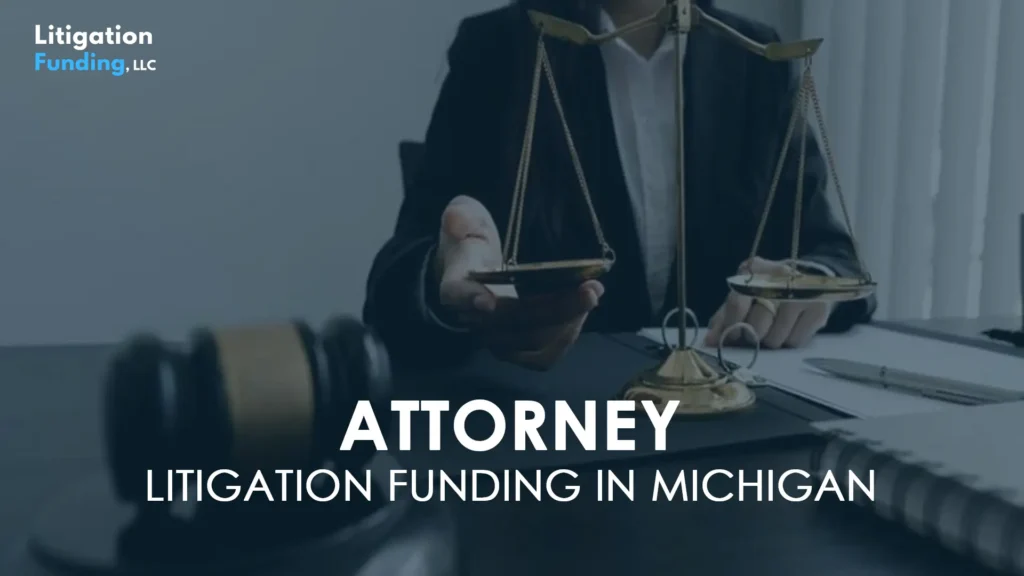Complex cases in Michigan can take years to resolve, putting financial strain on attorneys, especially those working on contingency. Attorney litigation funding helps firms stay operational and client-focused during long legal battles.
This content breaks down how attorney litigation funding works in Michigan, why it matters, and how to approach it ethically and strategically.
What Is Attorney Litigation Funding?
Attorney litigation funding is a financial resource provided directly to law firms or individual attorneys. Unlike plaintiff funding, which supports a client’s personal expenses, legal funding for attorneys helps cover litigation costs, expert witnesses, operational expenses, or payroll while waiting on case resolution.
In Michigan, litigation finance for law firms is commonly used for lengthy personal injury cases, commercial litigation, and class actions where payouts may take months or even years.
Why Attorneys in Michigan Use Litigation Funding
Attorneys across Michigan choose litigation funding as a tool to navigate the financial strain that comes with long and resource-intensive cases. With contingency based models and slow court timelines, law firms often face pressure to maintain operations without compromising case quality.
Litigation Funding Helps Manage Complex Cases
Lengthy trials involving expert testimony and significant filing requirements can quickly deplete a firm’s resources. Funding helps bridge the gap by covering case-related costs.
Funding Upfront Legal Costs Without Financial Risk
Law firms use funding to advance expenses such as court filing fees, discovery support, and expert witness retainers. This allows attorneys to pursue aggressive litigation strategies without delay.
Litigation Funding Supports Law Firms With Heavy Caseloads
Firms handling multiple cases simultaneously, especially in cities like Detroit, Lansing, and Grand Rapids, use litigation funding to avoid spreading resources too thin while maintaining the quality of representation.
Whether operating solo or running a mid-sized practice, litigation funding offers a pathway to financial stability and litigation strength.
How Attorney Litigation Funding Works
Attorneys seeking litigation funding in Michigan go through a clearly structured process designed to assess the viability of their cases. Funding is only extended when a case shows strong potential for recovery and aligns with non-recourse standards.
The process generally involves the following
- Attorneys submit their case documentation along with details about their legal portfolio and funding needs
- Litigation finance professionals assess the merits of the case and the likelihood of a successful resolution
- If the evaluation is favorable, the attorney receives a detailed funding offer that outlines terms and expectations
- Once accepted, funds are disbursed and can be used to support legal operations and case preparation
You only repay if the case is successful. If there is no recovery, repayment is not required.
Who Qualifies for Attorney Litigation Funding in Michigan?
Litigation funding companies assess several key elements before approving a Michigan law firm for financial support. Funding approval depends on your case types, portfolio strength, and past success with settlements or verdicts. Funders also ensure that the applying firm aligns with Michigan’s ethical and disclosure guidelines.
Law firms involved in personal injury, business litigation, medical malpractice, or class actions are commonly eligible. However, approval also depends on the firm’s willingness to maintain transparency and adhere to professional conduct standards during the funding relationship.
Benefits of Attorney Litigation Funding in Michigan
Attorney litigation funding in Michigan answers many of the practical questions attorneys have about managing long cases. The benefits go beyond cash flow support and extend into the quality of legal service delivered.
How does litigation funding help maintain firm operations
Litigation funding allows law firms to keep up with payroll, overhead, and client intake while cases remain unresolved. This continuity prevents operational slowdowns and protects the firm’s reputation.
Can law firms afford expert witnesses and research with funding
Yes. Attorneys use legal finance to cover costs such as depositions, expert opinions, eDiscovery, and trial preparation. This support ensures that cases are presented thoroughly and professionally.
How does it improve support for clients
With funding in place, attorneys avoid asking clients for upfront fees or retainers. This is particularly helpful in contingency-based models where clients may not have the means to contribute financially.
Does it reduce the pressure to settle early
Access to litigation funding allows attorneys to negotiate from a position of strength. Instead of settling prematurely due to financial constraints, law firms can focus on achieving fair outcomes based on the merits of the case.
Attorneys who utilize structured legal finance in Michigan often achieve stronger results while maintaining full control over their legal strategy.
Is Attorney Litigation Funding Legal in Michigan?
While attorney litigation funding is legal in Michigan, it must be approached with careful attention to ethics and professional responsibility. The Michigan Rules of Professional Conduct emphasize transparency and independence throughout the legal process.
Attorneys are required to disclose funding relationships when they are relevant to the case or impact the client’s interest. They must retain full control over litigation strategy and cannot allow funders to interfere with legal decisions. Additionally, avoiding any potential conflicts of interest with funders is critical.
By maintaining these professional standards, attorneys in Michigan can confidently use litigation funding as a responsible financial tool.
Comparing Attorney and Plaintiff Litigation Funding
It is important to distinguish attorney funding from plaintiff funding.
| Feature | Attorney Funding | Plaintiff Funding |
| Who receives funds | The law firm or attorney | The client or plaintiff |
| Use of funds | Case expenses and firm operations | Living costs, rent, or medical bills |
| Repayment responsibility | The firm, only if successful | The plaintiff, only if successful |
| Control over legal strategy | Fully retained by attorney | May involve more disclosure |
Choosing the Right Litigation Funder for Your Michigan Law Firm
Choosing the right litigation funder can significantly impact how effectively your firm manages financial needs and legal integrity. Michigan attorneys should carefully evaluate funding partners before entering into any agreement.
Look for clear terms and fair risk allocation
Ensure that all repayment terms, fees, and funding conditions are fully transparent. A reliable funder provides clear documentation with no hidden clauses.
Prioritize experience with Michigan law firms
Choose funders who understand the state’s legal environment and have a successful history working with local attorneys. Regional expertise helps streamline communication and approval.
Avoid funders that attempt to influence case outcomes
Ethical funders maintain professional boundaries and allow attorneys to retain full control of legal strategies. Stay clear of any provider who attempts to interfere with how you handle your cases.
Ethical and Legal Considerations for Attorney Litigation Funding
Attorney litigation funding is permitted in Michigan as long as it aligns with the state’s ethical and legal standards. The Michigan Bar allows these arrangements provided that attorneys maintain professional independence and transparency with their clients.
To remain compliant, attorneys must clearly inform clients about the funding relationship if it could influence any aspect of the case. They are also expected to follow the Michigan Rules of Professional Conduct regarding third-party payers. Most importantly, attorneys must ensure that funders have no control over the case’s direction or legal decisions.
When these guidelines are followed, attorney litigation funding is both legal and ethically sound within Michigan’s legal framework.
How to Apply for Attorney Litigation Funding in Michigan
Getting started with attorney litigation funding in Michigan is a straightforward process designed to support your firm without disrupting operations.
- Gather your list of qualifying active cases
- Provide firm information and case documentation
- Share estimated recoveries and legal timelines
Once your documentation is submitted, most qualified law firms receive a funding decision within a few business days. Ready to Secure Attorney Litigation Funding in Michigan? Apply today to get non-recourse financing tailored to your firm’s caseload and strategy. No risk. No upfront cost. Just the capital you need to win.
Final Thoughts on Attorney Litigation Funding in Michigan
Attorney litigation funding provides Michigan law firms with a critical financial tool to manage long and demanding cases. By securing reliable funding, attorneys can confidently support their clients, cover operational costs, and pursue justice without compromise.
As long as ethical standards are upheld and funders are carefully chosen, legal finance remains a powerful strategy for modern law firms.
Frequently Asked Questions
Can solo attorneys apply for litigation funding?
Yes. Solo attorneys with qualifying cases and financial need can access attorney litigation funding, especially if working on contingency.
Is this considered a loan?
No. Attorney litigation funding is structured as a non-recourse advance. Repayment is required only if the case generates a recovery.
Does it impact the outcome of a case?
Ethical funding arrangements do not affect legal strategy or outcomes. Attorneys retain full control of case decisions.
Is interest charged on attorney litigation funding?
No, traditional interest is not charged. Instead, a discount rate is applied based on the case’s risk, complexity, and duration.
Can attorney funding be used for multiple cases at once?
Yes. Many law firms use litigation funding to support portfolios of cases, not just a single dispute.
How is the funding amount calculated for law firms?
Funders evaluate the projected recovery of the case or group of cases, along with firm performance history and potential litigation duration.


